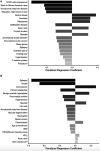Factors associated with lower quarter performance-based balance and strength tests: a cross-sectional analysis from the project baseline health study
- PMID: 39081837
- PMCID: PMC11287662
- DOI: 10.3389/fspor.2024.1393332
Factors associated with lower quarter performance-based balance and strength tests: a cross-sectional analysis from the project baseline health study
Abstract
Objectives: Physical performance tests are predictive of mortality and may screen for certain health conditions (e.g., sarcopenia); however, their diagnostic and/or prognostic value has primarily been studied in age-limited or disease-specific cohorts. Our objective was to identify the most salient characteristics associated with three lower quarter balance and strength tests in a cohort of community-dwelling adults.
Methods: We applied a stacked elastic net approach on detailed data on sociodemographic, health and health-related behaviors, and biomarker data from the first visit of the Project Baseline Health Study (N = 2,502) to determine which variables were most associated with three physical performance measures: single-legged balance test (SLBT), sitting-rising test (SRT), and 30-second chair-stand test (30CST). Analyses were stratified by age (<65 and ≥65).
Results: Female sex, Black or African American race, lower educational attainment, and health conditions such as non-alcoholic fatty liver disease and cardiovascular conditions (e.g., hypertension) were consistently associated with worse performance across all three tests. Several other health conditions were associated with either better or worse test performance, depending on age group and test. C-reactive protein was the only laboratory value associated with performance across age and test groups with some consistency.
Conclusions: Our results highlighted previously identified and several novel salient factors associated with performance on the SLBT, SRT, and 30CST. These tests could represent affordable, noninvasive biomarkers of prevalent and/or future disease in adult individuals; future research should validate these findings.
Clinical trial registration: ClinicalTrials.gov, identifier NCT03154346, registered on May 15, 2017.
Keywords: 30-second chair-stand test; biomarkers; community-dwelling adults; physical functional performance; project baseline health study; single-legged balance test; sitting-rising test.
© 2024 Taylor, Carroll, Short, Celestin, Gilbertson, Olivier, Haddad and Cauwenberghs.
Conflict of interest statement
MC and SS are employees of Verily Life Sciences. The remaining authors declare that the research was conducted in the absence of any commercial or financial relationships that could be construed as a potential conflict of interest.
Figures




Similar articles
-
Performance on sit-to-stand tests in relation to measures of functional fitness and sarcopenia diagnosis in community-dwelling older adults.Eur Rev Aging Phys Act. 2021 Jan 8;18(1):1. doi: 10.1186/s11556-020-00255-5. Eur Rev Aging Phys Act. 2021. PMID: 33419399 Free PMC article.
-
Sit-to-Stand Video Analysis-Based App for Diagnosing Sarcopenia and Its Relationship With Health-Related Risk Factors and Frailty in Community-Dwelling Older Adults: Diagnostic Accuracy Study.J Med Internet Res. 2023 Dec 8;25:e47873. doi: 10.2196/47873. J Med Internet Res. 2023. PMID: 38064268 Free PMC article.
-
Nutrition Risk Is Associated with 3-Year Strength and Performance Indicators among Older Adults in the Canadian Longitudinal Study on Aging.J Nutr Health Aging. 2023;27(10):868-877. doi: 10.1007/s12603-023-1980-3. J Nutr Health Aging. 2023. PMID: 37960910
-
Diagnostic accuracy and clinical impact of MRI-based technologies for patients with non-alcoholic fatty liver disease: systematic review and economic evaluation.Health Technol Assess. 2023 Jul;27(10):1-115. doi: 10.3310/KGJU3398. Health Technol Assess. 2023. PMID: 37839810 Free PMC article.
-
[SENTIERI - Epidemiological Study of Residents in National Priority Contaminated Sites. Sixth Report].Epidemiol Prev. 2023 Jan-Apr;47(1-2 Suppl 1):1-286. doi: 10.19191/EP23.1-2-S1.003. Epidemiol Prev. 2023. PMID: 36825373 Italian.
References
Associated data
LinkOut - more resources
Full Text Sources
Medical
Research Materials

